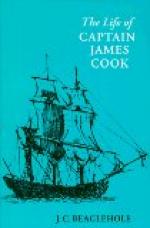Till a few years ago writers on the subject were content to draw their information as to the first voyage of Cook to the South Seas from the so-called history of Dr. Hawkesworth. This gentleman, who posed as a stylist (Boswell calls him a “studious imitator of Dr. Johnson"), was introduced by Dr. Charles Burney to Lord Sandwich for the express purpose of writing an account of the expedition, and was supplied with all the records in the possession of the Admiralty relating to it, he had access to the Journal of Sir Joseph Banks, the Notes of Dr. Solander and others who accompanied Cook, and, more than all, he had the opportunity of personal communication with the leaders of the party. Notwithstanding these advantages he interpolated so much of his own speculations, conclusions, and dissertations, as to render his voluminous work not only extremely unreliable but often extremely ridiculous. Travellers to the South Seas record that the accounts of things and places described as seen by Cook are remarkably correct, but that the inferences drawn are wrong. They do not realise that the statements of fact are Cook’s, whilst the deductions and ornamentations are Hawkesworth’s, and were strongly resented by Cook. Boswell relates that he told Johnson that he had met Captain Cook at dinner at Sir John Pringle’s (then President of the Royal Society), and gave him an account of a conversation they had together. Johnson:
“was much pleased with the conscientious accuracy of that celebrated circumnavigator, who set me right as to many of the exaggerated accounts given by Dr. Hawkesworth of his voyages.”
Cook’s opinion on the subject may be seen from his determination to prepare his Journals for the press himself in the future.
Within the last few years the Journal of the Endeavour has been published under the able supervision of the late Admiral Sir W.J.L. Wharton, and the Journal of Sir Joseph Banks, which was missing for a long time, has been recovered and published by Sir Joseph Hooker; and these two books may be preferred with safety over all others that have been written on the subject.
Memorial to the king.
It had been calculated that a Transit of Venus would occur in 1769, observations of which would be of great importance to astronomical science, and several of the European nations, notably Russia, were intending to establish points of observation. The Royal Society decided that as England had hitherto taken a lead in astronomy, she should not now fall behind, and appointed a committee to report on the places where it would be desirable to take observations, the methods to be pursued, and the persons best fitted to carry out the work. This committee advised that two observers should be sent to Hudson’s Bay, two to the South Pacific and, if Sweden did not send there, two to the North Cape. They also advised that the Government should be asked to supply a ship to




